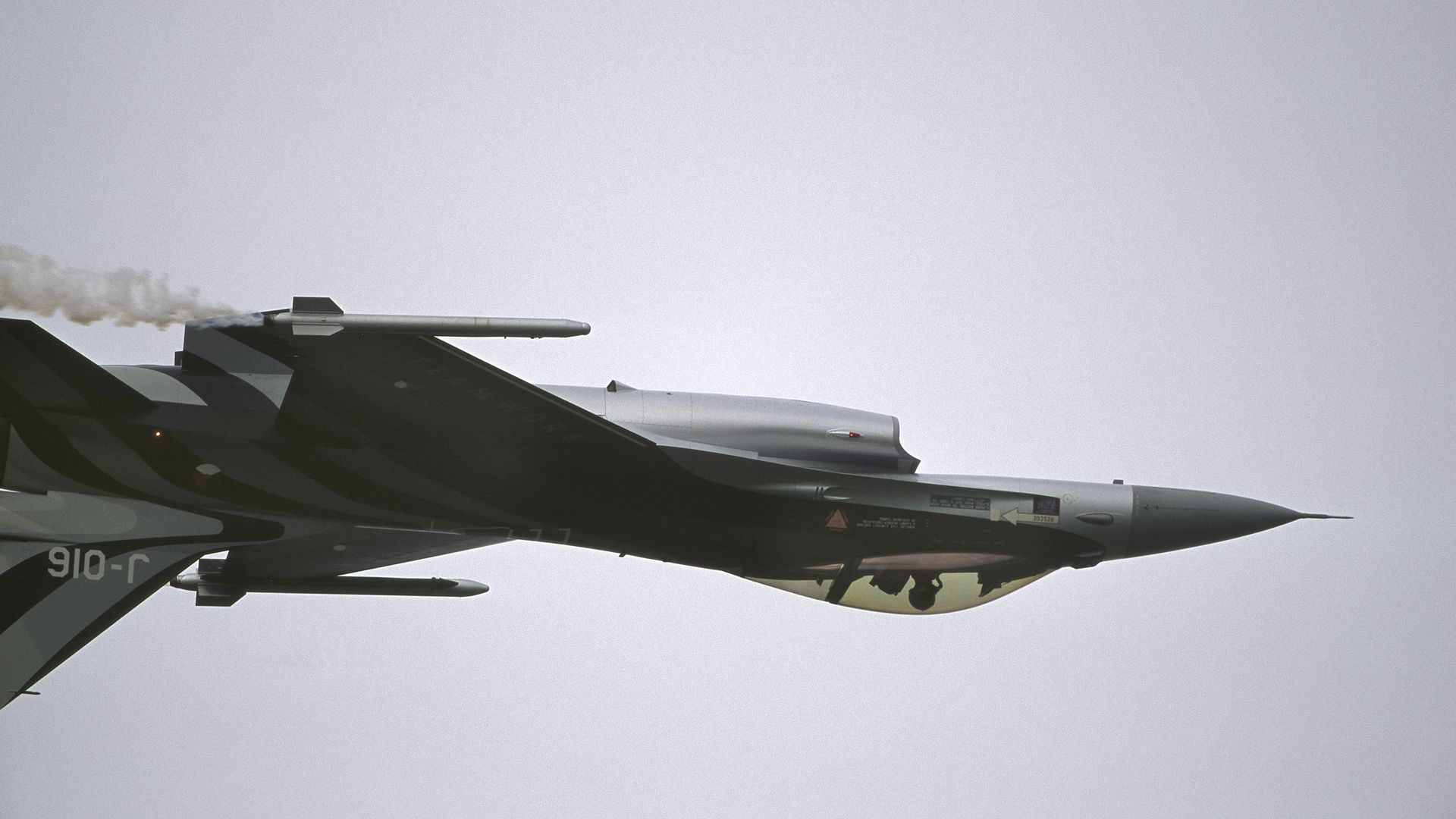
An F-16A flying inverted in 2001. Photo by: aviation-images.com/Universal Images Group via Getty Images
The recent online leak of Pentagon information is providing some deja vu to gamers, who’ve seen the release of military secrets in video game forums turn into a trend in recent years.
Why it matters: Past incidents show how hard it is to stop such leaks. It’s easy to post documents online, and the urge to win an argument or otherwise impress online peers is strong.
Driving the news: Since mid-2021, fans of the realistic military-themed game War Thunder have occasionally posted classified or otherwise restricted information related to British, French, Chinese and U.S. weapons systems, sending forum moderators scrambling to delete the messages.
- The most recent leak on War Thunder’s forum, involving restricted documentation about the capabilities of the U.S.-made F-16A fighter jet, was published by a user on Jan. 15.
- It was deleted the next day after another user questioned whether it violated publisher Gaijin Entertainment’s extensive prohibitions on posting “restricted information.”
Catch up quick: Federal authorities arrested and charged Jack Teixeira, a 21-year-old member of the Massachusetts Air National Guard, last week in connection with the Pentagon intelligence leak.
- He allegedly first shared the classified information in order to impress a group of friends using the popular online community platform Discord, where they bonded over games and guns.
What they’re saying: “Our players are very passionate about War Thunder and military vehicles, and sometimes they’re too passionate,” Anton Yudintsev, founder of Budapest-based Gaijin Entertainment, tells Axios.
- War Thunder lets players battle each other using virtual versions of real tanks and planes, which the developers aspire to depict as accurately as possible.
- Players expect authenticity, Yudintsev says, offering a notable example of a tank used by the French military: “When someone prefers to play Leclerc in War Thunder, they are usually motivated to convince the dev team to increase the tank performance by providing some documentation.”
In 2021, a War Thunder user claiming to have crewed a real Leclerc tank posted a portion of the manual before moderators deleted it.
- Yudintsev believes there have been at least six such leaks that community members have flagged and that forum moderators have deleted. He stresses that his developers don’t read the leaks and implores fans not to post them.
- “We’ll never use classified or restricted information in our work. It’s both illegal and pointless, as we’ll have no means to determine if those ‘secret documents’ are even genuine,” Yudintsev says.
The big picture: These leaks are, among other things, a content moderation problem.
- Managers of online communities say it’s tough to stop the digital spills in part because of the challenge of assessing the veracity of the sensitive information they contain.
- On Friday, Discord’s chief legal officer Clint Smith said in a blog post that “classified military intelligence documents pose a significant, complex challenge for Discord as they do for other online platforms,” because only the government can confirm if they’re authentic.
- Discord is cooperating with authorities but there is no “structured process” for the government to tell platforms like Discord when they have classified info, Smith said.
Between the lines: Discord fielded nearly 2,000 legal requests in the final three months of 2022, according to the company’s most recent transparency reportbut a rep for the company did not reply to an Axios question about how many, if any, requests Discord receives about classified leaks.
The bottom line: The impact of military leaks can vary greatly.
- War Thunder fans, carried away as they’ve been, are trying to one-up each other about weapons systems, to maybe convince developers to tweak a setting for a jet or tank that has been encountered on the battlefield for decades.
- That’s not the same as sharing nearly real-time info about an active war, as Teixeira is accused of doing.
- What the incidents share is the insular dynamic of the online forum, which feeds obsessions, fuels status competition and makes some participants feel they have license to post secrets with impunity.
Editor’s note: This story was originally published on April 20.






